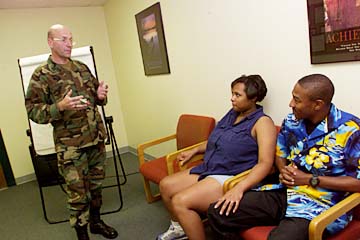

[AT YOUR SERVICE]

The Army drills In 1999, Schofield Barracks Col. Jose Riojas was worried about the increase in the incidents of domestic violence and disputes and the numbers of spouses wanting to leave their husbands and return to the mainland early. He tasked his chaplain to find ways to be more preventive and less reactive.
in marriage
A new voluntary program is
helping enlisted newlyweds
navigate matrimonial minefieldsAT YOUR SERVICE
By Gregg K. Kakesako
gkakesako@starbulletin.comWorking with community health nurses, Maj. Jonathan McGraw, chaplain for Riojas' 25th Infantry Division's artillery unit, developed a program which encompassed marital training, mental and physical health, referral services and community resources.
"It's more a holistic approach," said Capt. Alvin Shrum, who succeeded McGraw as the artillery's unit chaplain, "than just marriage counseling. It involves the mind, the body and the spirit. We're looking at a person's whole well being."
That program was so successful in counseling Army couples in the 1,200-member artillery unit that a year later it was applied throughout the 25th Division at Schofield.
Eventually, it caught the attention of Lt. Col. Glen Bloomstrom, family ministry officer at the Office of Army Chaplains, and with the blessing of the Army Chief of Staff Gen. Eric Shinseki, it is now being tested in 17 brigades throughout the Army, keying on first-term newly-married soldiers. It is strictly voluntary, but there are bonuses for the soldiers who complete the course. Riojas moved on to the Pentagon last summer and is now one of Shinseki's assistants.
The concept pioneered at Riojas' unit was implemented in May at Fort Bragg, N.C.; Fort Hood, Texas; Fort Drum, N.Y.; Fort Wainwright and Fort Richardson, Alaska; and Germany.
Bloomstrom said the plan is to increase the number of participating brigades to 215 within the next four years.

Private First Class Denisse Foster, a medic, said she and her husband, Staff Sgt. Marvin Foster, entered the program because she was looking for a better way to communicate with her husband."Communication is a big thing with me," said Denisse Foster, 27, who acknowledged that she is a lot more outgoing than her husband.
Specialist Jason Stanbro, 23, was hoping to find "a way to jump-start his marriage."
"We had just gotten married," said Stanbro, "and I was looking for things to look out for."
Shrum estimates that there are 787 married soldiers in his artillery unit with about half of them completing the 80-hour course, which can be done in three consecutive weekends.
But with deployments and other tasks facing Schofield Barracks soldiers, that's not always possible.
The Fosters took two years to finish the course.
All of the sessions, attended by about 30 couples, are generally held off post. Shrum holds one three-weekend session per quarter. The first session, which lasts only a day, is devoted to marital training and health assessment. Couples are asked to honestly fill out a personality inventory survey.
Jason and Heather Stanbro were surprised how accurate the survey turned out to be.
"We're both extroverts," said Jason Stanbro. "We're both sensing and not judgmental and express a lot of emotion."
"I'm an introvert," Marvin Foster added, "she's an extrovert. I don't like to sit and dwell on a problem. She likes to vent."
Denisse Foster added, "I wasn't surprised by the results of the survey. I thought I knew him. I knew he was an introvert when we got married. I thought I could change him, but ... "
During the health assessment, which is also done during the first session, the couples develop a genealogical chart to see if there is a family history of tobacco and alcohol abuse, stress or family violence. On the other end of the "genogram" the couples look for patterns of spirituality, exercise and nutritional habits.
In the second all-day session, couples learn about preventive medicine. At the end of the session they are interviewed by a community health nurse and if they want they can seek additional counseling at the alcohol and drug abuse prevention center.
The final session is spread over a weekend and focuses on spiritual growth, commitment, sexuality and friendship.
The Army says a survey conducted by a Tripler Army Medical Center researcher showed that 55 percent to 78 percent of those who participated in the initial program in 1999 said it improved their life.
Victoria Niederhauser, who conducted the survey, said 69 percent of the respondents said the program improved their relationship with their spouse or their partner and 49 percent said it improved their work relations.
McGraw said with nearly 70 percent of today's soldiers being married, there is a greater need for this type of counseling. "When we first started," McGraw said, "we surveyed our group and found that of 608 people, only 38 had any type of marriage counseling or training."
Shrum and other division leaders said the success of the program, which now costs about $31,000 a year to run, has hinged on couples like the Fosters and Stanbros.
"It helps newly married couples know what to expect down the road," said Marvin Foster, who has been married for four years. "It is especially helpful to the spouse who is the non-military person. It explains to them why things are done a certain way."
Shrum added that it helps the non-military spouse understand "how to live in the Army. It explains why her husband has to be at morning formation at 5 in the morning. Why he just can't come home during the day even when it appears he isn't doing anything at work. The Army has its own jargon. It's a system unlike the civilian system. It's a different lifestyle."